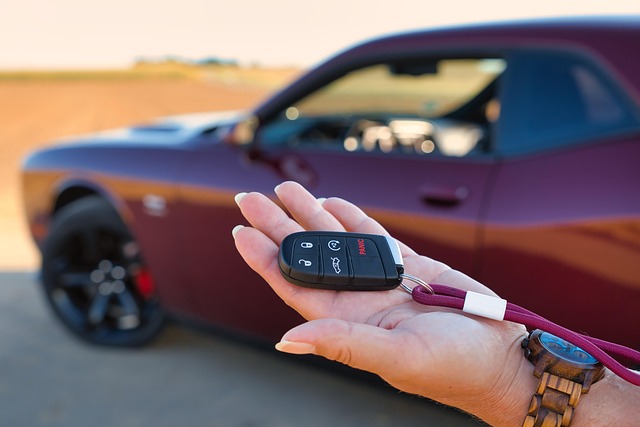Learn how to register your car in California with our step-by-step guide. Before you begin, understand the basic requirements for car registration in the Golden State. You’ll need to gather essential documents for VIN verification, perform a Vehicle Identification Number (VIN) check, and submit applications along with the required fees. By following these straightforward steps, you’ll be on your way to receiving your California registration certificate promptly.
- Understand the Requirements for Car Registration in California
- Gather Necessary Documents for VIN Verification
- Perform Vehicle Identification Number (VIN) Check
- Submit Applications and Required Fees
- Receive Your California Registration Certificate
Understand the Requirements for Car Registration in California

Before registering your car in California, it’s crucial to understand the state’s requirements. One key step is ensuring your vehicle has a valid Vehicle Identification Number (VIN) verification. This process involves checking the vehicle’s unique 17-character VIN against state records to confirm its authenticity and history. In California, you’ll need to present this information during the registration process, typically done through the Department of Motor Vehicles (DMV).
Additionally, consider utilizing a mobile vin verifier for convenience. Mobile vin verification services allow you to complete this critical step remotely, providing peace of mind before committing to the registration. This streamlined approach, often facilitated by apps or specialized services, can save time and effort compared to traditional methods, ensuring a smoother car registration experience in California.
Gather Necessary Documents for VIN Verification

To register your car in California, you’ll first need to gather all the essential documents for VIN (Vehicle Identification Number) verification. This process is crucial and involves several key elements. Among them, you’ll require a completed California Vehicle Registration application form, along with proof of insurance that meets state minimums.
Additionally, a valid driver’s license or identification card, as well as proof of ownership through a title document (if applicable), are mandatory. For convenience, many Californians opt for a mobile VIN inspection or use a mobile vin verifier to streamline this initial step. Having these documents ready ensures a smoother registration process and avoids potential delays when you visit the California Department of Motor Vehicles (DMV).
Perform Vehicle Identification Number (VIN) Check

Before registering your car in California, it’s crucial to perform a Vehicle Identification Number (VIN) check. This step ensures that your vehicle is genuine and hasn’t been reported stolen or had any previous damage. A mobile VIN verifier can facilitate this process by providing a quick and convenient vin inspection right at your location. Many services offer this on-site verification using advanced technology to cross-reference the VIN with state records, helping to avoid potential issues during the registration process.
During the VIN verification, a professional will use specialized tools to confirm the vehicle’s history, including its make, model, year, and any reported accidents or outstanding liens. This is an essential step in California as it allows the Department of Motor Vehicles (DMV) to issue a clean title, which is necessary for successful car registration. Having a reliable mobile vin inspection service on hand ensures a smooth transition from ownership transfer to official registration.
Submit Applications and Required Fees

To register your car in California, you’ll need to submit several applications and pay the required fees. The process begins with gathering essential documents, including proof of ownership, a valid driver’s license, and current vehicle registration (if applicable). You’ll also need to conduct a VIN verification, which can be done through a mobile vin verifier for added convenience. This step ensures that your vehicle’s information matches the records, promoting accuracy in the registration process.
The application package typically includes forms from the California Department of Motor Vehicles (DMV), such as the Application for Title and Registration. Alongside these, you’ll submit the necessary fees, which cover the registration cost, title transfer (if applicable), and possibly a smog inspection or emissions test certificate, depending on your vehicle’s age and type. A mobile vin inspection can aid in streamlining this process by providing immediate results and saving you a trip to the DMV.
Receive Your California Registration Certificate

After successfully applying for your California car registration, the next step is to receive your official certificate. This document is crucial for proving that your vehicle is legally registered and insured in the state. Typically, you’ll be mailed a Registration Certificate, which serves as a permanent record of your vehicle’s registration status.
If you prefer a faster and more convenient option, consider using mobile vin inspection or mobile vin verification services. These services send a professional to your location to perform a vin verification, ensuring that all details on your car’s VIN (Vehicle Identification Number) match the state records. This is particularly useful if you’ve recently purchased a used vehicle or want to streamline the registration process.
Registering a car in California involves several straightforward steps, from understanding the requirements to submitting applications and fees. Ensure you have all necessary documents for a smooth process, including proof of ownership and identification. After completing the vin verification and necessary checks, you’ll receive your California registration certificate, marking the successful conclusion of the process.
